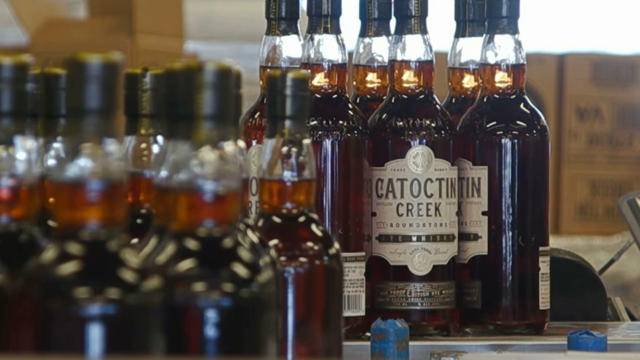Craft whiskey and other spirits are booming in the U.S – thanks partly to Europe’s growing taste for it.
But suddenly caught in the crossfire of a global trade battle, the fortunes of American distillers may be about to change.
CGTN’s Owen Fairclough reports from Virginia.
Catoctin Creek Distilling was founded nearly 10 years ago as the first distillery in Virginia’s Loudoun County since Prohibition.
Inside an airy warehouse in the heart of pretty Purcellville, Chief Distiller Becky Harris is inspecting the latest batch of the company’s award-winning whiskey.
“This is my rye,” Becky declares. “I like a lot of fruit and spice in the flavor profile.” (I confirm it’s delicious).
Becky and husband Scott started Catoctin nearly 10 years ago.
“This part of the Mid-Atlantic was full of rye whiskey before Prohibition. We wanted to bring some of that back,” Becky explains.
They brought it back and then took it transatlantic.
The couple spent years and $100,000 to develop a new export market in the European Union.
This year, the EU was on course to account for around a quarter of their business until Catoctin was caught in a trade battle.
Scott, Catoctin’s General Manager explains: “Now we’re really starting to see it just take off and all of a sudden these trade tariffs will impose a 25 percent price increase on us.”
The EU has targeted distilled spirits along with hundreds of U.S. products in retaliation for the US applying 25 percent duties on EU metal imports.
Distilled spirits have enjoyed huge growth in the U.S over the last 20 years and are now manufactured and exported from 42 U.S States. The impact of those tariffs is being felt across the country.
According to the Distilled Spirits Council, nearly half of the exports are being targeted by tariffs. And it’s not just the liquor.
The tanks used in the distilling process are made from European metal – and even they’ve been hit by tariffs imposed by the Trump administration.
Multinational companies also caught in the crossfire can move production overseas, stockpile inventory and even absorb price increases.
But that’s not an option for distillers like Catoctin that are founded on local supply chains – as the bags of malted rye used in the mash testify.
And that means rivals who aren’t saddled with tariffs will benefit.
“Countries like Scotland, obviously, but also Ireland, and France… Canadian whiskey going into Europe as well. So we’re competing with all of those world whiskies,” Scott said.
At least this setback doesn’t mean layoffs for a business that has grown employ 20 people in the heart of this community.
They’re determined to keep rolling out the barrel so the world can enjoy a taste of rural Virginia.
“American whiskey is some of the finest out there,” Scott said, taking a break between labeling the latest batch inspected by a vigilant Becky on the production line.
“Let us compete freely and fairly and we’ll always win. But once we start seeing tariffs come in, it becomes very difficult to compete.”
 CGTN America
CGTN America

